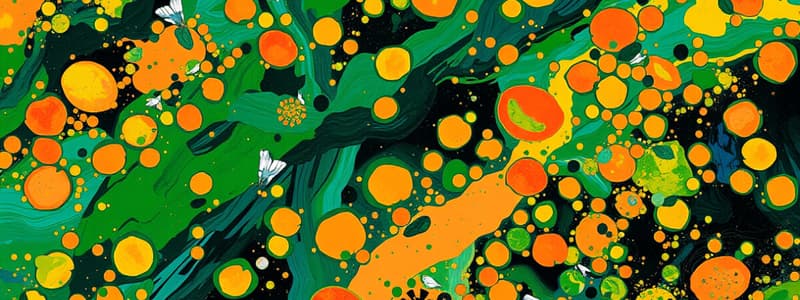Podcast
Questions and Answers
What type of compounds can be classified as organic nutrients?
What type of compounds can be classified as organic nutrients?
- Minerals
- Carbon Dioxide
- Water
- Vitamins (correct)
Vitamin C can be produced by the human body.
Vitamin C can be produced by the human body.
False (B)
What disease is caused by a deficiency in vitamin C?
What disease is caused by a deficiency in vitamin C?
Scurvy
Goitre is often caused by a deficiency of ______.
Goitre is often caused by a deficiency of ______.
What is the minimum daily requirement for macrominerals?
What is the minimum daily requirement for macrominerals?
Match the following diseases to their associated nutrient deficiencies:
Match the following diseases to their associated nutrient deficiencies:
Inorganic substances cannot be destroyed by cooking.
Inorganic substances cannot be destroyed by cooking.
Our body utilizes nutrients from food for ______, growth, and cell repair.
Our body utilizes nutrients from food for ______, growth, and cell repair.
What issue was phosphorus identified as a cause of over 40 years ago?
What issue was phosphorus identified as a cause of over 40 years ago?
Phosphorus is harmful to aquatic ecosystems only when present in large amounts.
Phosphorus is harmful to aquatic ecosystems only when present in large amounts.
What legislation regulates phosphorus discharges in Alberta?
What legislation regulates phosphorus discharges in Alberta?
Phosphorus is a naturally occurring element that is abundant in _____ soils.
Phosphorus is a naturally occurring element that is abundant in _____ soils.
Match the following phosphorus pollution reduction tips with their descriptions:
Match the following phosphorus pollution reduction tips with their descriptions:
Which of the following practices can help reduce phosphorus pollution from households?
Which of the following practices can help reduce phosphorus pollution from households?
Algae blooms are beneficial for aquatic life as they provide essential nutrients.
Algae blooms are beneficial for aquatic life as they provide essential nutrients.
What can municipal and industrial strategies do to manage phosphorus discharge?
What can municipal and industrial strategies do to manage phosphorus discharge?
Flashcards are hidden until you start studying
Study Notes
Phosphorus: Environmental Impact
- Excessive phosphorus in water bodies leads to uncontrolled algae growth, impacting aquatic ecosystems.
- Algae blooms can deplete dissolved oxygen levels, endangering fish and aquatic animals.
- Some algae produce toxins, posing health risks to wildlife and humans.
- Manufacturers have reduced phosphorus content in detergents due to environmental concerns.
Phosphorus Regulation in Alberta
- Alberta's Environmental Protection and Enhancement Act regulates phosphorus discharge from municipalities and industries.
- Pollution prevention strategies and advanced technologies have enabled reductions in phosphorus in wastewater.
- Some municipalities have adopted phosphorus reduction programs, successfully lowering discharge into water bodies.
- Managing phosphorus runoff from agricultural and urban areas is essential; fertilizer use requires careful oversight.
Tips to Reduce Phosphorus Pollution at Home
- Use fertilizers appropriately and test soils before application to avoid over-fertilization.
- Properly dispose of pet waste to minimize nutrient runoff.
- Protect riverbanks by maintaining vegetation to reduce soil erosion.
- Compost phosphorus-rich kitchen scraps instead of using garbage disposals to prevent wastewater contamination.
Body Chemistry and Nutrients
- The human body consists of chemicals derived from food, categorized as organic and inorganic nutrients.
- Organic Compounds: Include carbohydrates, proteins, lipids, and vitamins; essential for health and mostly derived from plants.
- Vitamin C is critical for connective tissue formation; deficiency can lead to scurvy, characterized by bleeding gums and bruising.
- Inorganic Compounds: Minerals necessary for bodily functions; not destroyed by cooking.
- Microminerals are essential in minute quantities, essential for enzyme functions and overall health.
Health Implications of Nutrient Deficiencies
- Iodine deficiency can cause goiter, swelling of the thyroid, prevalent in regions with low seafood consumption.
- Nutritional deficiencies can yield severe health consequences, impacting growth, energy, and repair of body tissues.
- Soil contains essential nutrients but is not a viable food source for humans; direct consumption would be ineffective.
Studying That Suits You
Use AI to generate personalized quizzes and flashcards to suit your learning preferences.




